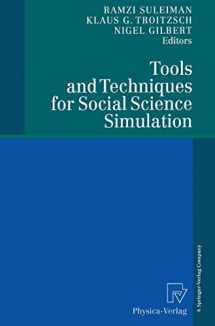
Tools and Techniques for Social Science Simulation
ISBN-13:
9783790812657
ISBN-10:
379081265X
Author:
Nigel Gilbert, Klaus G. Troitzsch, Ramzi Suleiman
Publication date:
2000
Publisher:
Physica
Format:
Paperback
387 pages
Category:
Econometrics & Statistics
,
Economics
,
Computer Simulation
,
Computer Science
,
Methodology
,
Social Sciences
,
Sociology
FREE US shipping
Book details
ISBN-13:
9783790812657
ISBN-10:
379081265X
Author:
Nigel Gilbert, Klaus G. Troitzsch, Ramzi Suleiman
Publication date:
2000
Publisher:
Physica
Format:
Paperback
387 pages
Category:
Econometrics & Statistics
,
Economics
,
Computer Simulation
,
Computer Science
,
Methodology
,
Social Sciences
,
Sociology
Summary
Tools and Techniques for Social Science Simulation (ISBN-13: 9783790812657 and ISBN-10: 379081265X), written by authors
Nigel Gilbert, Klaus G. Troitzsch, Ramzi Suleiman, was published by Physica in 2000.
With an overall rating of 3.5 stars, it's a notable title among other
Econometrics & Statistics
(Economics, Computer Simulation, Computer Science, Methodology, Social Sciences, Sociology) books. You can easily purchase or rent Tools and Techniques for Social Science Simulation (Paperback) from BooksRun,
along with many other new and used
Econometrics & Statistics
books
and textbooks.
And, if you're looking to sell your copy, our current buyback offer is $0.3.
Description
The use of computer simulations to study social phenomena has grown rapidly during the last few years. Many social scientists from the fields of economics, sociology, psychology and other disciplines now use computer simulations to study a wide range of social phenomena. The availability of powerful personal computers, the development of multidisciplinary approaches and the use of artificial intelligence models have all contributed to this development. The benefits of using computer simulations in the social sciences are obvious. This holds true for the use of simulations as tools for theory building and for its implementation as a tool for sensitivity analysis and parameter optimization in application-oriented models. In both, simulation provides powerful tools for the study of complex social systems, especially for dynamic and multi-agent social systems in which mathematical tractability is often impossible. The graphical display of simulation output renders it user friendly to many social scientists that lack sufficient familiarity with the language of mathematics. The present volume aims to contribute in four directions: (1) To examine theoretical and methodological issues related to the application of simulations in the social sciences. By this we wish to promote the objective of designing a unified, user-friendly, simulation toolkit which could be applied to diverse social problems. While no claim is made that this objective has been met, the theoretical issues treated in Part 1 of this volume are a contribution towards this objective.


We would LOVE it if you could help us and other readers by reviewing the book
Book review

Congratulations! We have received your book review.
{user}
{createdAt}
by {truncated_author}


